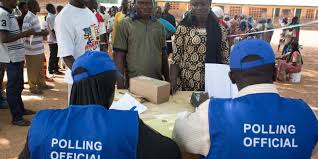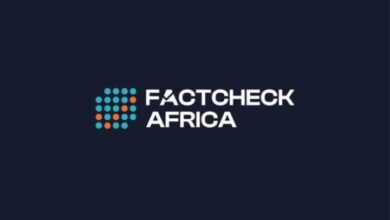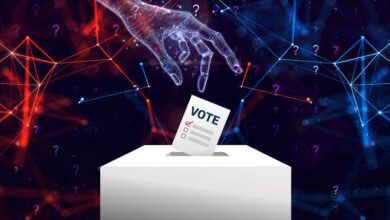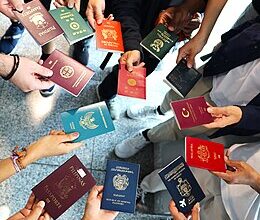Report: Ghana’s Information Space Faces Emerging Threats Ahead of General Elections

By Oluwaseye Ogunsanya
Ghana’s general elections, scheduled for December 7, 2024, will be a significant one as voters prepare to elect the President and members of Parliament. With President Nana Akufo-Addo completing his term limit, the presidential race has been touted to be highly competitive as it features prominent political figures such as current Vice President Mahamadu Bawumia from the New Patriotic Party (NPP) and former President John Mahama from the National Democratic Congress (NDC). These two parties dominate Ghana’s political landscape despite the existence of 27 registered political parties.
However, the 2024 elections introduce new dynamics that could challenge the traditional two party arrangement. Alan Kyerematen, a former Trade Minister and once a strong contender for the NPP’s presidential nomination, has formed the Movement for Change after missing out on the party’s ticket. Running as an independent candidate, Kyerematen aims to disrupt the established political order. Similarly, real estate developer Nana Kwame Bediako announced his candidacy under the New Force Movement in January 2024, further broadening the field of candidates.
A July 2024 poll conducted by Global Info Analytics shows John Mahama leading the race with 51.1% of the vote, followed by Mahamadu Bawumia with 38.2%. Alan Kyerematen holds 5.3%, while Nana Kwame Bediako trails with 4.6%. These figures suggest a competitive race, with the potential for a runoff if no candidate achieves the majority vote required for a decisive win.
Ghana’s political system, based on the 1992 Constitution, operates as a democratic multi-party framework with a president as the head of state and government, a unicameral parliament, and an independent judiciary. The Electoral Commission of Ghana is responsible for overseeing the electoral process, ensuring that elections are conducted according to constitutional guidelines. The Commission also manages voter registration, conducts elections, and handles any electoral disputes that arise.
The 2020 presidential election, which saw President Akufo-Addo re-elected for a second term, was marred by allegations of voter intimidation and electoral fraud by his main challenger, John Mahama. These allegations were ultimately dismissed by the Supreme Court due to insufficient evidence, but they highlight the contentious nature of Ghana’s electoral processes.
With 17,027,641 registered voters, the key dates in the 2024 election timetable include the receipt of nominations from September 9-13, the balloting for positions on the presidential ballot paper on September 23, and the parliamentary ballot on September 24. The general election is set for December 7, with a potential runoff scheduled for December 28.
As the general elections approach, issues such as corruption, political violence, and vote-buying are likely to play a significant role in shaping the electoral landscape and the country faces the task of addressing these democratic challenges to ensure a peaceful and credible election.
With that being said, this article however seeks to Xray some of the emerging layers of threats in the country’s online information space.
The Emerging Threats
One of the most pressing concerns in the run up to the 2024 general elections is the interplay between online disinformation, targeted harassment, and the potential for offline violence which has been seen to become critical and now posing significant risks to the integrity of the electoral process of the Ghana which is renowned in West Africa for democracy and political stability.
According to the findings of a comprehensive risk assessment conducted by the International Republican Institute (IRI), there is a pervasive spread of disinformation across social media platforms, particularly on WhatsApp and Facebook, which are Ghana’s most widely used digital platforms.
“WhatsApp is the leading online media platform in Ghana, used by 10.1 million people, almost half of all Ghanaians with access to the internet. As in previous elections, both the ruling party and the opposition are actively using WhatsApp to spread their messages. Facebook is the next most popular platform, with 7.4 million users. The two main political parties use Facebook to spread disinformation and attack their opponents. Although X (previously Twitter) is not as popular, with only 1.17 million users in Ghana, it is still a key platform for discussion of national issues.” the report revealed.
The report also stated that both the ruling New Patriotic Party (NPP) and the opposition National Democratic Congress (NDC) have been implicated in the deliberate dissemination of false information aimed at discrediting their opponents.
“The ruling party and the opposition both use disinformation and smear campaigns which are rapidly distributed through social media and other online platforms such as closed messaging apps. The main narratives spread through social media include: the ruling party exaggerating government achievements to secure a third term and the opposition criticising the ruling party and undermining trust in election systems. Both leading parties rely on targeted attacks on their opponents, including hate speech and name calling.” the report reads.
This was corroborated by the Institute for Security Studies (ISS) in a report that also stated that pre-election rhetoric is already heating up, with both parties making divisive statements on campaign platforms.
“This has always characterised Ghanaian elections, but the 2024 polls are being organised amid heightened suspicion stemming particularly from developments regarding the EC and the fallout from the 2020 ballots, whose results the NDC rejected.” It added.
There is also the existence of targeted online harassment and hate speech directed at vulnerable groups, including journalists, women, LGBTQI+ individuals, and tribal communities. These groups face significant risks both online and offline, with female political candidates subjected to misogynistic attacks and LGBTQI+ individuals facing criminalization under pending legislation awaiting presidential assent. The law criminalizes those who use the internet to advocate for or support LGBTQI+ activities. Despite these constitutional guarantees, the report revealed that journalists in Ghana are vulnerable to intimidation, hate speech, and harassment.
Relatively, the report warns that Ghana’s history of peaceful elections may be under threat from the potential for offline violence, which could escalate if election results are contested. Youths, particularly those affiliated with political parties, have been fingered as potential instigators of violence, driven by promises of political rewards. Ghana’s political parties have however signed a code of conduct on vigilantism and election violence in July 2024 under the aegis of the National Peace Council (NPC). According to the Kofi Annan Foundation, there will be a series of dialogues with electoral stakeholders, especially party youth groups, in Ghana’s six “geopolitical zones”. This will then lead up to the signature of a public pledge by the presidential candidates in the run-up to the elections to eschew any hate speech or condone any violence, and to respect the outcome of the elections, or take their grievances to the courts rather than the streets.
In addition, there is an emerging risk of the potential misuse of generative artificial intelligence (AI) in the electoral process. Citing an example of deepfake video falsely implicating a candidate in corruption during the parliamentary primaries earlier this year, the report suggests that AI-generated deepfakes could be weaponized to spread false narratives, further complicating the task of ensuring information integrity by the Ghana’s Ministry of Communications and Digitalization who is finalising a draft AI policy and ethical guidelines which is currently awaiting cabinet approval. The document was drafted to ensure AI’s responsible development and application in Ghana.
Conclusion
The findings from IRI’s assessment paint a gory picture of the challenges Ghana faces as it approaches the 2024 elections. To tackle these early warning signs and protect the integrity of Ghana’s democracy, there must be a coordinated response from all stakeholders involved including the civil society organisations, the electoral commission, the government, electorates and international partners.
Public awareness campaigns, robust fact-checking initiatives, and stringent enforcement of laws against hate speech and election-related violence are essential at this critical juncture; the actions taken now will determine whether the 2024 elections can serve as a model of democratic resilience in the digital age in Africa.
Edited by Habeeb Adisa




